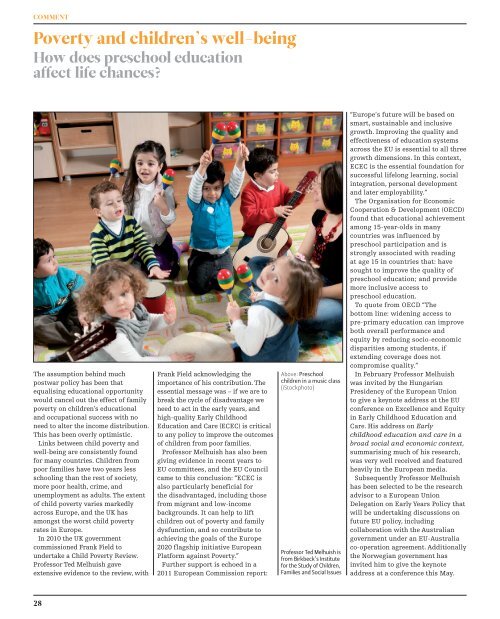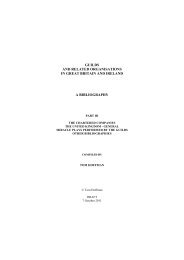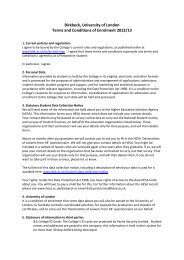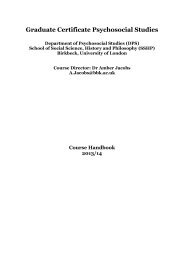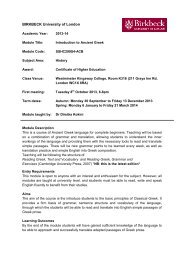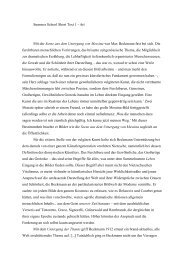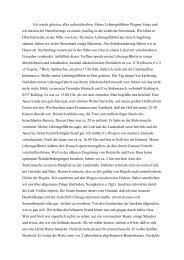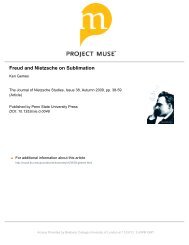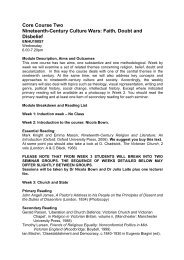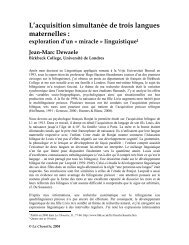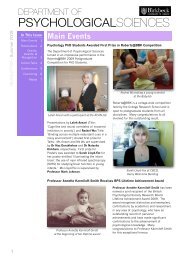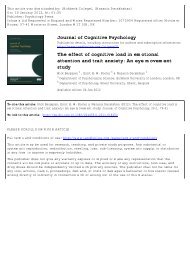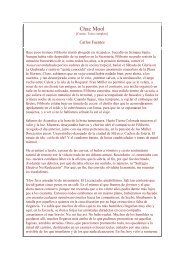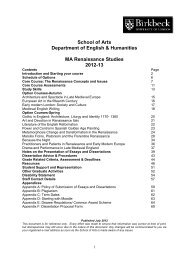Spring 2011 - Birkbeck College
Spring 2011 - Birkbeck College
Spring 2011 - Birkbeck College
You also want an ePaper? Increase the reach of your titles
YUMPU automatically turns print PDFs into web optimized ePapers that Google loves.
COMMENT<br />
Poverty and children’s well-being<br />
How does preschool education<br />
affect life chances?<br />
The assumption behind much<br />
postwar policy has been that<br />
equalising educational opportunity<br />
would cancel out the effect of family<br />
poverty on children’s educational<br />
and occupational success with no<br />
need to alter the income distribution.<br />
This has been overly optimistic.<br />
Links between child poverty and<br />
well-being are consistently found<br />
for many countries. Children from<br />
poor families have two years less<br />
schooling than the rest of society,<br />
more poor health, crime, and<br />
unemployment as adults. The extent<br />
of child poverty varies markedly<br />
across Europe, and the UK has<br />
amongst the worst child poverty<br />
rates in Europe.<br />
In 2010 the UK government<br />
commissioned Frank Field to<br />
undertake a Child Poverty Review.<br />
Professor Ted Melhuish gave<br />
extensive evidence to the review, with<br />
28<br />
Frank Field acknowledging the<br />
importance of his contribution. The<br />
essential message was – if we are to<br />
break the cycle of disadvantage we<br />
need to act in the early years, and<br />
high-quality Early Childhood<br />
Education and Care (ECEC) is critical<br />
to any policy to improve the outcomes<br />
of children from poor families.<br />
Professor Melhuish has also been<br />
giving evidence in recent years to<br />
EU committees, and the EU Council<br />
came to this conclusion: “ECEC is<br />
also particularly beneficial for<br />
the disadvantaged, including those<br />
from migrant and low-income<br />
backgrounds. It can help to lift<br />
children out of poverty and family<br />
dysfunction, and so contribute to<br />
achieving the goals of the Europe<br />
2020 flagship initiative European<br />
Platform against Poverty.”<br />
Further support is echoed in a<br />
<strong>2011</strong> European Commission report:<br />
Above: Preschool<br />
children in a music class<br />
(iStockphoto)<br />
Professor Ted Melhuish is<br />
from <strong>Birkbeck</strong>’s Institute<br />
for the Study of Children,<br />
Families and Social Issues<br />
“Europe's future will be based on<br />
smart, sustainable and inclusive<br />
growth. Improving the quality and<br />
effectiveness of education systems<br />
across the EU is essential to all three<br />
growth dimensions. In this context,<br />
ECEC is the essential foundation for<br />
successful lifelong learning, social<br />
integration, personal development<br />
and later employability.”<br />
The Organisation for Economic<br />
Cooperation & Development (OECD)<br />
found that educational achievement<br />
among 15-year-olds in many<br />
countries was influenced by<br />
preschool participation and is<br />
strongly associated with reading<br />
at age 15 in countries that: have<br />
sought to improve the quality of<br />
preschool education; and provide<br />
more inclusive access to<br />
preschool education.<br />
To quote from OECD “The<br />
bottom line: widening access to<br />
pre-primary education can improve<br />
both overall performance and<br />
equity by reducing socio-economic<br />
disparities among students, if<br />
extending coverage does not<br />
compromise quality.”<br />
In February Professor Melhuish<br />
was invited by the Hungarian<br />
Presidency of the European Union<br />
to give a keynote address at the EU<br />
conference on Excellence and Equity<br />
in Early Childhood Education and<br />
Care. His address on Early<br />
childhood education and care in a<br />
broad social and economic context,<br />
summarising much of his research,<br />
was very well received and featured<br />
heavily in the European media.<br />
Subsequently Professor Melhuish<br />
has been selected to be the research<br />
advisor to a European Union<br />
Delegation on Early Years Policy that<br />
will be undertaking discussions on<br />
future EU policy, including<br />
collaboration with the Australian<br />
government under an EU-Australia<br />
co-operation agreement. Additionally<br />
the Norwegian government has<br />
invited him to give the keynote<br />
address at a conference this May.


